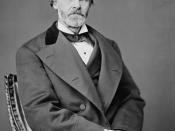In the late nineteenth-century, the United States was faced with an
amazing set of circumstances. Industrialization was increasing the country's
output and making way for inventions that would change everyday life.
Industrialization was also regressing the country to a time when the people were
poor and ruled by a few. Labor relations were tense to say the least. This was a
result of people being worked for long hours with little pay. Violence erupted
and an overwhelming percentage of the population was impoverished. Still, the
electric light was invented, the Bessemer process increased steel production,
machinery increased agricultural output and many miles of railroad were laid.
Many good and many bad things resulted from the explosion of capitalism. The
question about capitalism that every person must have asked themselves was
this: Were the good things that came of the late nineteenth-century worth the
lives, poverty and oppression? The answer in many minds was no.
Mr. Forrest McDonald attempted to answer this question in his essay.
McDonald ended his essay with a statement on the Sherman Antitrust Act. Of
this act, McDonald stated the following: '...it would lead Americans very near to
killing the goose that had laid the golden eggs.' Trusts were what kept
corporations in power during the time of the Sherman Antitrust Act. The
objective of the act was to help relieve the pressure that trusts could put upon
small businesses. Although McDonald was correct in his statement that the
Sherman Antitrust Act was stupid because it did little to help the situation, his
assessment of trusts as laying golden eggs was wrong. The only golden eggs
that a trust laid were quickly stolen by the people controlling the trust. While it
may have been trusts and monopolies that made America a world power, the
only people who...


